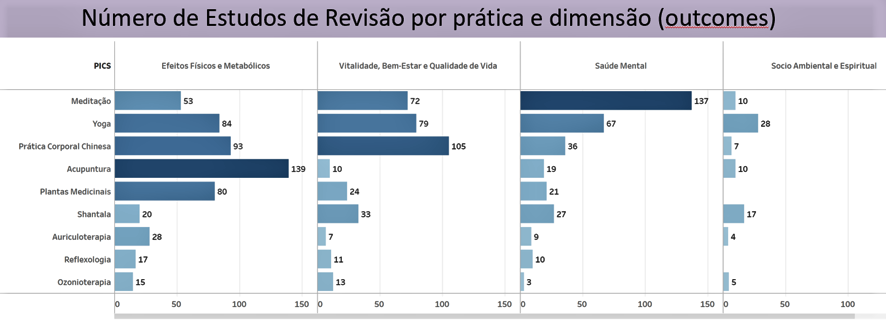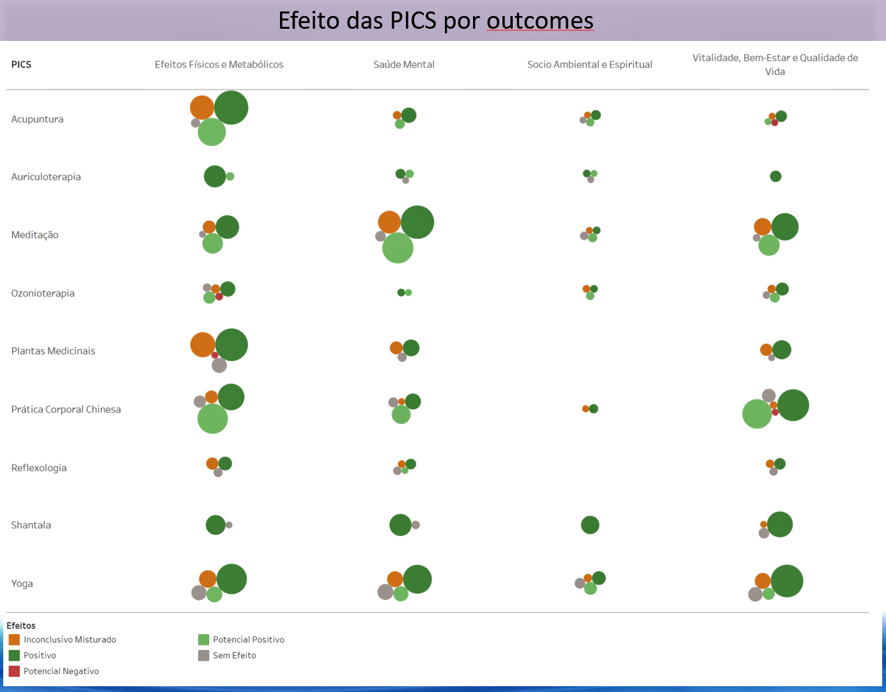Mapping of scientific evidence reveals how resources from Traditional, Complementary and Integrative Medicines (TCIM) are effective in the treatment of physical and mental illnesses and contribute to the improvement of well-being and quality of life, guiding public health policies in Brazil and in the world.
This was the call for News published by the Brazilian Academic Consortium for Integrative Health (CABSIn, in its Portuguese acronym) to disseminate the Evidence Maps on clinical effectiveness for nine Integrative and Complementary Health Practices (PICS, in its Portuguese acronym ), which were officially launched on November 5th at an event online promoted by the PAHO Representation in Brazil and the Latin American and Caribbean Center on Health Sciences Information of the Pan American Health Organization (BIREME/PAHO/WHO).
According to Socorro Gross, PAHO/WHO Representative in Brazil, the evidence maps will allow us to “continue to strengthen and systematize scientifically based knowledge and continue to offer people the possibility of fighting to make these practices available in a safe and timely manner for the common good of our populations, leaving no one behind”.
For Diego González, director of BIREME, the maps “will place the evidence in the hands of decision makers and the population to use PICS within the framework of a set of solutions to health issues”.
Veronica Abdala, Manager of Information Products and Services at BIREME, presented a summary of the main findings from the systematization of the more than 800 revision studies included in the maps. Each map presents a graphical distribution of the studies by types of intervention, by health conditions (outcomes) grouped into six 
The first PICS Evidence Maps
The first evidence maps developed by BIREME are the result of the collective effort of the TCIM Americas Network, the Brazilian Academic Consortium for Integrative Health (CABSIn), with support from the National Coordination of Integrative Practices of the Ministry of Health of Brazil and the PAHO Representation in Brazil. In fact, the demand came from the Ministry of Health of Brazil based on the PNPIC, and the idea was to select some practices to serve as proof of concept for the Evidence Map methodology. In fact, the result was positive: the methodology was improved by BIREME, a group of more than 40 researchers were trained to apply the methodology and the maps produced are already being applied in the formulation of recommendations and guidelines for health teams.
Altogether, there are fourteen maps of evidence that are available for access in the TCIM Americas VHL.
Clinical effectiveness of Phytotherapy and Medicinal Plants for:
Wound Healing and Acute Diseases
Mental Health and Quality of Life
Metabolism and Physiological Disorders
Clinical Effectiveness of Acupuncture
Clinical Effectiveness of Meditation
Clinical Effectiveness of Yoga Practice
Clinical Application of Oral Ozone Therapy
Clinical Effectiveness of Shantala
Clinical Effectiveness of Reflexology
Clinical Effectiveness of Mind and Body Practices of Traditional Chinese Medicine
Clinical Effectiveness of Auriculotherapy
Clinical Effectiveness of Ozone Therapy
About Evidence Maps
Evidence Map is an emerging method of knowledge translation that seeks to synthesize, identify, describe and characterize the scientific evidence that exists for a given topic or health condition. Knowledge translation is one of the strategies that contributes to narrowing the historical gap that exists between available scientific knowledge and the adoption of this knowledge by health systems and services at all levels.
BIREME adopted and adapted this methodology to systematize and facilitate access to available evidence on the clinical applicability of PICS as well as to identify gaps in knowledge in this area. One of the maps systematized the evidence available from reviews and randomized clinical studies on the application of some integrative practices in the clinical management of the symptoms of COVID-19, for improving immunity and for mental health in conditions of social isolation and trauma. This map was the basis of the recommendation of the National Health Council (CNS) to the Ministry of Health of Brazil, the State Councils, the Federal District and Municipal Health, in the sense of wide dissemination to the managers, workers and users of the evidence referring to the PICS in this pandemic moment of COVID-19.
New maps on PICS are on the way, for example: Homeopathy, Apitherapy, Reiki and Brazilian Medicinal Plants.
The meeting also included the participation of the National Observatory of Traditional, Integrative and Complementary Health Knowledge and Practices (ObservaPICS), an initiative that shares experiences and studies about PICS with researchers, health professionals, managers and users of the Brazil’s Unified Health System (SUS). Click here to access the Observatory’s Evidence Bulletins (in Portuguese).
